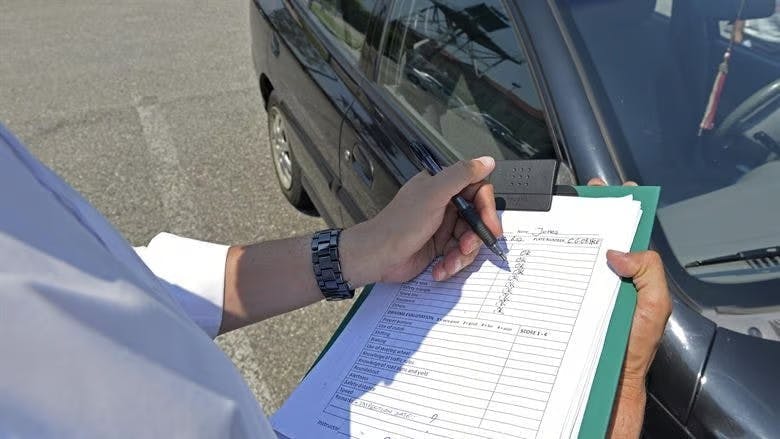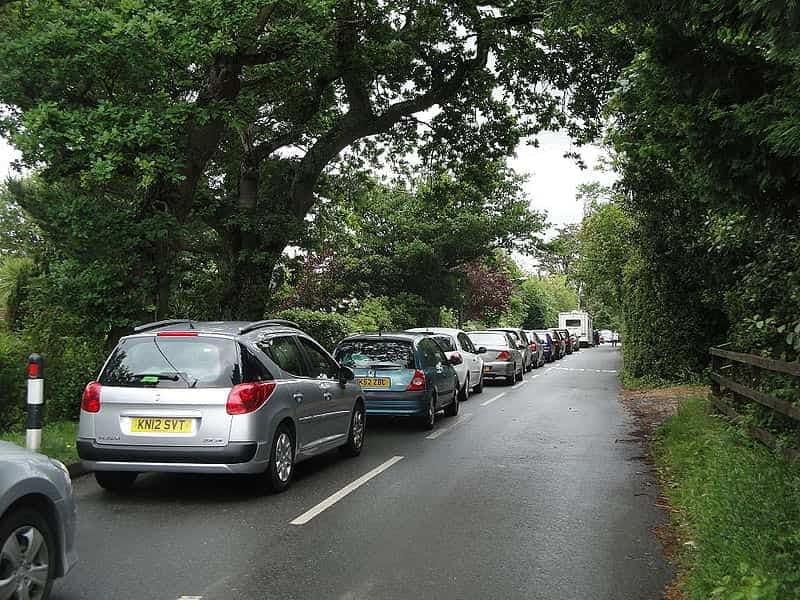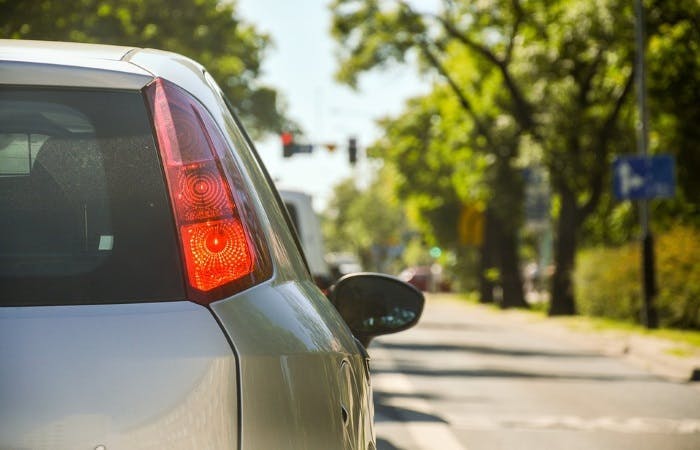Whether your practical test is months away or right around the corner, we're willing to bet that you've heard plenty about it. In fact, everyone seems to have an opinion, a “fact” or a horror story to share. Unfortunately, not everything they say is completely accurate. Driving test myths abound — and while you might think it's easy to separate the fact from the fiction, some stories have become so prevalent that it's not always as simple as you might hope.
It's our mission at PassMeFast to make sure learners are ready for what really happens during the driving test. After all, the more you know, the more prepared you'll be, and the more likely you are to pass! That's why we've set about to crush some of the most common driving test myths out there and provide you with the truth (the whole truth, and nothing but the truth).
1. “Driving examiners have a pass quota… and they hate learners”

Failing your driving test can be a disheartening experience — you've gone through weeks of training, only to strumble at the final hurdle. Most learners eventually come to see this as a valuable lesson and a chance to work on their shortcomings. Others, however, try to shift the blame to someone else — and that someone is usually the driving examiner. In fact, learners' frustration with examiners is so strong that many of the most common driving test myths concern them.
We're sure you'll have heard someone claim, for example, that all driving examiners have a pass or fail quota that they must meet. It's the perfect excuse for a learner who failed, as it takes the blame completely out of their hands. Of course, it also couldn't be further from the truth. There is no such thing as a pass quota — the only number that determines whether you pass or fail is the number of faults you accrue during your test. (It's also interesting to note that the learners who repeat this claim when they've failed a test suddenly forget all about “fixed results” once they've passed!)
Frequently linked to this myth is the idea that examiners are a grumpy ol' bunch who will simply fail anyone they don't like. After all, they have plenty of reasons to be annoyed: in recent years, their workload has sharply increased — more students, more tests to fit in the day and no financial reparation in return. Plenty of reasons to fail students on purpose then?
Of course not. Examiners have nothing to gain from failing you. If anything, failing you only adds to their (already heavy) workload!
If you're worried about the possibility of a driving examiner failing you for any unjustified reasons, there are a couple of things you can do. Firstly, you can take your driving instructor on your test — they're a reliable witness and a comforting presence, and they might even break the ice by striking up a conversation with the examiner.
Secondly, try to be friendly with the examiner — they're human too! All it takes is a smile and a bit of small talk to lighten the mood.
2. “If you stall the car, you will automatically fail”

It's easy to see why so many students believe this particular myth. Stalling on your test definitely isn't ideal, after all! However, the severity of the fault varies depending on the context of the situation.
It's not the action of stalling a car that can lead to an examiner failing you — it's the actions you take after stalling. Reasons why you might fail include panicking, repeatedly stalling without correcting your mistake, or putting other road users in danger.
Speaking from personal experience, it is indeed possible to still pass after stalling. I managed to stall the car a few times during my test. While it was a stressful experience (I was definitely close to tears!), I still passed. Want to know why? It's because the examiner was watching how I reacted to the entire ordeal. If you do stall on your test, the trick is to keep calm and react as safely as possible. Restart the car and evaluate the road before setting off again. Do this, and the examiner won't have a reason to fail you.
Other myths in the same vein include examiners failing students simply for taking the wrong turn. Fortunately for those of you who haven't got the best memory, you won't fail your test for forgetting or misinterpreting a direction given to you by the examiner. It's a driving test, after all — not a memory test! If you take a wrong turn, the examiner will give you new directions to get you back on the right track. Similarly, if you forget a direction, simply ask the examiner to repeat themselves.
If you're convinced that you have failed during your driving test, you need to do one thing: carry on anyway. The worst thing you could possibly do is stop or tell yourself that there's no point in continuing. You never know what could happen—the examiner might see things differently.
You might also find it useful to look at our guide to driving test faults so you know exactly what the examiner will be looking out for on your test.
3. “Drive slowly — it shows the examiner you're a careful driver”

On the surface, this piece of advice might seem like a good idea at the time. After all, driving slowly will surely tell the examiner that you're a safe driver, right? The answer is a definite no. Instead of seeing a safe and considerate driver, the examiner will assume that you don't know how to control the car properly — or that you're scared of the road. Either way, you're hardly giving them evidence that you're ready to be a qualified driver.
Taking the examiner's opinion of your level of confidence out of the equation, driving slowly can also be dangerous. If you're travelling at a snail's pace, it will lead to a queue of cars driving behind you. A number of situations can arise from this. If a car behind you is getting impatient and tailgating you, it could cause an accident if you were to stop suddenly. Similarly, impatience could lead to a driver speeding ahead of you to avoid getting stuck behind you — potentially creating a serious hazard.
Showing frequent hesitation when driving also won't gain you any favour from the examiner. If you wait for 10 minutes at a junction even though you could have moved off several times over, it won't come across well. If you hesitate and freeze up, you could cause a major accident. However, the examiner will understand (and expect) a level of test day nerves.
After all, I didn't just stall on my test — I also ended up giving way to cars on a mini-roundabout, even though I had right of way. The examiner certainly gave me an earful about it during my feedback!
During your test, you should drive as you would with your instructor — sticking to speeds that are appropriate for the road you're on and the conditions you're in. Attempting to change your style of driving to cater to your examiner won't help you.
Remember: your instructor wouldn't let you go for a test if they didn't think you were ready. So trust their opinion and believe in yourself, because the pro believes you can do it.
As long as you avoid the common mistakes people make on their test, you'll be fine. If you're looking for ways to make yourself feel better, check out these driving test horror stories!
4. “Driving schools make you take more lessons than you need to pass”

The DVLA and driving schools—PassMeFast included—will tell you that you need around 40-50 hours of professional tuition overall before you attempt to take your first practical test. Of course, not everyone agrees with this suggestion. We've lost count of how many learners call up and tell us that they're test-ready and raring to go after just a few hours in the car with their friends or family.
Guidelines, however, are in place for a reason. If you go in for a test before you're ready, you could end up putting yourself, other road users and the examiner in danger. And if you have a particularly awful experience on your test, it could set you back months in terms of confidence. With that in mind, we always urge learners to get the right amount of tuition before they go in for their test.
Of course, every learner is different. Some pick up skills in barely any time at all — one of our past students, Ruhith, passed after only 25 hours of tuition! Others, by comparison, need many more lessons before they're confident enough to take their test. Learning to drive can be a tough process, but it's necessary in helping you build up vital skills like clutch control, speed awareness and hazard perception.
Not sure how many hours you need? Use our Course Recommender to find out — after answering a few questions, it'll tell you which driving course would be ideal for you.
5. “The driving test is harder to pass now”

The difficulty of the driving test is entirely relative to each learner. Some have no problems with the test format, while others wish they'd been able to pass years ago when the test was “easier”. Of course, there's no doubt that the practical test is challenging — it's certainly changed a lot since its inception. Learners nowadays have to complete more independent driving, use sat navs and confidently tackle various manoeuvres — to name just a few of the major innovations!
However, while you certainly will need to work hard before you get that shiny new licence, this doesn't mean you should give up before you start. People pass the driving test every day — and if they can do it, so can you! Remember that the driving test simply condenses various aspects of real-life driving into a shorter time span. In other words, nothing you'll need to demonstrate here is out of the ordinary — all the skills you demonstrate here will be necessary for you to drive confidently on a day-to-day basis.
The driving test might be a challenge, but it's not impossible—at least, if you're learning with the right driving school. It doesn't even matter what your age is, you're never too old to pass your driving test with PassMeFast.
As you'll see from our pass photos, we've helped thousands of learners become qualified drivers over the years. How? It all comes down to our DVSA-approved instructors, who are experienced with helping all types of learners pass. They don't just focus on securing students a bare pass, though: they also help students become safe and confident drivers for life.
PassMeFast has a range of intensive and semi-intensive courses on offer—from beginner courses to refresher courses—designed to teach you those all-important skills, fast. It doesn't matter if you're learning in an automatic or manual car, or what your level of experience is: you can book a course with us and ditch the L plates in weeks.
Give us a quick call on 0333 123 4949 or book a course online to get started today.
Practical Driving Test FAQs
1. Will the test centre provide a car on the day of my test?
No. There's no such thing as a “special car” provided by the test centre. You'll have to use your instructor's car, or your own, if it passes the DVSA's guidelines. For more information about this, read up on taking the test in your own car.
2. What do I need to bring on test day?
There's always a lot of confusion surrounding this, but the answer is actually quite simple. The only things you need on the day of your test are your provisional licence (so, make sure not to lose it!) and a car to take the test in. The DVSA also states that you must bring your theory test pass certificate. In practice, examiners won't always ask for this, but it's better to bring it to be safe!
3. Does my instructor have to sit in on my test?
It's entirely up to you. Some students see it as a comforting presence that offers extra reassurance, while others worry about making mistakes in front of them. As long as you let them know your decision in advance of the test, you'll be fine.
Alternatively, you can have a friend or family member present, provided that they don't interfere with the test in any way.
4. Will I need to perform an emergency stop in my test?
You have a 1-in-3 chance of being asked to perform an emergency stop during your test, so you should make sure you're comfortable with it before you go in for your test. You'll also be asked to demonstrate one manoeuvre.
5. When will the examiner ask me the “show me, tell me” questions?
The examiner will ask you one “tell me” question at the start of your test — before you start driving. They'll then ask you the “show me” question while you're driving, e.g., “Show me how you would wash the windscreen”.
6. How long will the practical test take?
It will take approximately 40 minutes overall. This could vary if you run into traffic.
7. Can anyone guarantee that I will pass?
Yet another driving test myth! A lot of driving schools offer “guaranteed passes”, but they can't 100% guarantee that you'll actually pass your test. The smartest move is to invest in your own tuition. Put in the work, and you can guarantee your own success!
Want a safety net? Check out PassProtect — our fairer, cheaper, and simpler alternative to the supposed "guaranteed pass".
8. What happens if I don't pass?
It's not the end of the world if you fail — you'll just have to wait 10 working days to be able to take another test. You can get PassMeFast to book you another one—skipping the long driving test waiting times—and get a discounted refresher course on top!
Subscribe for driving advice, offers & more
We'd love to let you know about our courses, news and offers via email. You may unsubscribe at any time.
Star Genie Limited trading as PassMeFast. Company number 10093359
Copyright © 2024 owned by Star Genie Limited
PassMeFast, Blue Tower, MediaCityUK, Salford, M50 2ST

